The Green Unit was coached by the legendary Viktor Tihonov, whose all-powerful, dictatorial style brought the team great successes, but at the cost of the freedom of his players, who were required to not only train, but live in the team's training base for 11 months out of the year.
The Green Unit is the predecessor to the later, but better known "Russian Five" of the 1997 Stanley Cup champion Detroit Red Wings, which consisted of forwards Larionov, Sergei Fedorov and Slava Kozlov with Fetisov and Vladimir Konstantinov on defense
The focus of the film is seven-time World Champion, two-time Olympic gold medalist, two-time Stanley Cup champion and Canada Cup winner and Soviet National Team captain Fetisov, who resisted the control of Tikhonov and sought to change the system from within all while refusing to take the quick way out by defecting as others had done. One of the most interesting aspects of the film is the creative, free flowing style of the Soviet team while living under a repressive political system in contrast to the North American teams had all the personal freedoms one could hope for but played a rigid style of hockey with a heavy dose brutality.
Red Army opened in theaters in New York and Los Angeles on January 23rd, in San Francisco and Washington D. C. on January 30th, Chicago on February 6th and will open in San Diego, Dallas, Houston, Minneapolis, Philadelphia, Baltimore, Boston, Miami, Ft. Lauderdale, Boca Raton, West Palm, Phoenix and in the New York and Los Angeles areas this Friday, February 13th.
The movie will also open in Denver, Atlanta, St. Louis, Buffalo (2/20), Seattle, Portland, Detroit, Kansas City (2/27), Tampa, Cleveland, Cincinnati, Pittsburgh (3/6), Columbus (3/13) and Indianapolis (3/27) among many, many other smaller markets between February 20th and March 27th.
In honor of the wider US release of Red Army beginning this Friday and continuing nationwide over the course of the next month, this week we are featuring each member of the Soviet Central Red Army Hockey Club's famed "Green Unit", beginning with defenseman Kasatonov, who was born in 1959 in what was then known as Leningrad in the Soviet Union.
Kasatononv played seven seasons in the NHL following a 15 year career in the Soviet Elite League, which began with SKA Leningrad in 1976-77. He would play for SKA for two seasons after which he moved to CSKA Moscow, known more commonly as the Red Army Hockey Club, who were able to collect all the best players in the Soviet Union through their power to make the players they desired members of the Soviet Army and assign them to the army sports club's hockey team as part of their military duty.
This loophole also allowed the Soviet veterans to continue to play together in the Olympics as amateurs, as they were not technically paid to play hockey, but were paid as soldiers in the military, much to the annoyance and frustration of the Canadians, whose players to paid directly as professional athletes, and therefore not eligible to compete in the Olympics after the conclusion of their junior careers.
While playing for his country, Kasatonov won gold medals at the World Championships in 1981, 1982, 1983, 1986 and 1989 and a silver medal in the 1980 and gold medals in both the 1984 and 1988 Olympics as a member of the famed "Green Unit".
After two seasons of attempting to run the once mighty Soviet club with their NHL marketing savvy, the Russians figured they had learned all they needed to know, and felt they could run the show themselves without having to give Pittsburgh a 50% cut of the profits. The North Americans were only too happy to head home, having had enough close calls with the meddlesome Russian Mafia, who not only kicked the team's sponsors out of their "Super Boxes", but were responsible for the assassinations of as many as three of the team's staff!
In 1995-96, all the multinational sponsors pulled out, CSKA were eliminated from the playoffs in the first round and the team had the water and electricity turned off before being locked out of their own arena. In the upheaval afterwards, long-time CKSA head coach Tikhonov was ousted and responded by forming his own, incredibly similarly named team, HC CKSA Moscow!
While the original CSKA Moscow "Red Army" club returned to their previous star logo, the upstart new HC CSKA Moscow adopted the "Russian Penguin" identity as their own, creating much confusion among jersey collectors, as the Penguin logo was used for eight consecutive seasons, but by two separate, but nearly identically named clubs.
The CSKA Moscow "Russian Penguins" jerseys were red with black and white trim. The HC CSKA Moscow "Russian Penguins" jerseys were also red with black and white trim with LG sponsorship and the letters XK (Cyrillic for HC to differentiate themselves from CSKA Moscow) added to the upper chest of the penguin logo before a change to red jerseys with blue and white trim as shown in today's featured jersey.
After six seasons of two separate "Red Army" clubs, they were merged for the 2002-03 season, bringing to an end the use of the Russian Penguins logo.

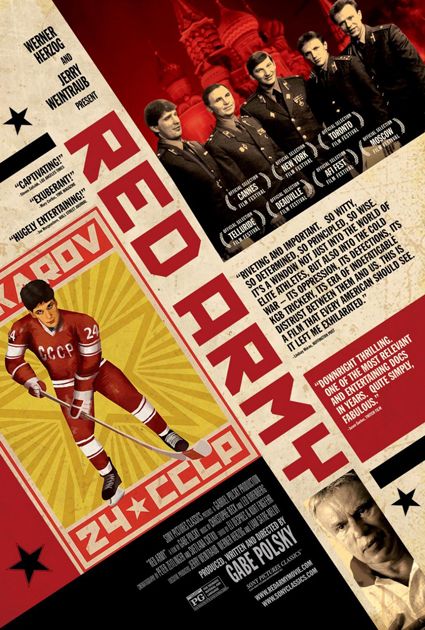
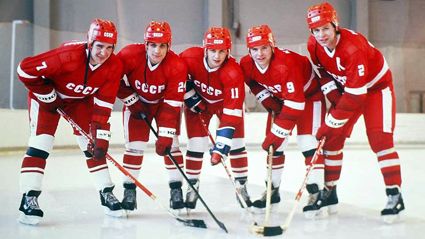
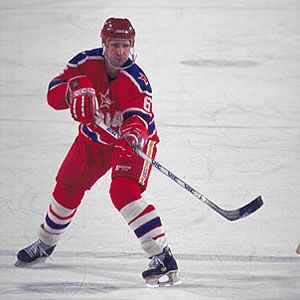
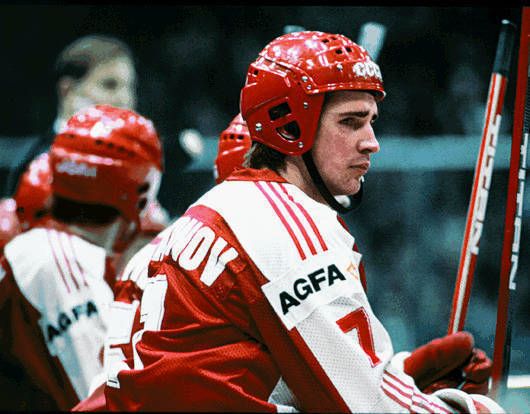
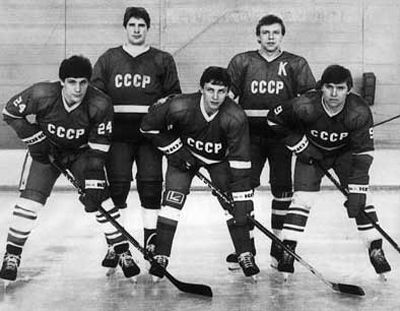
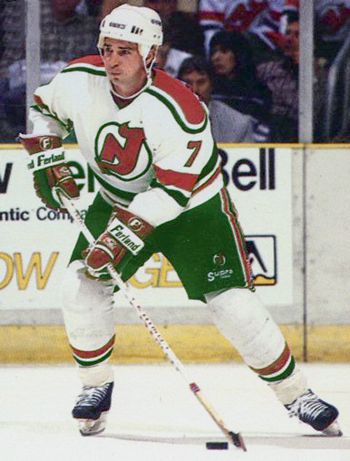
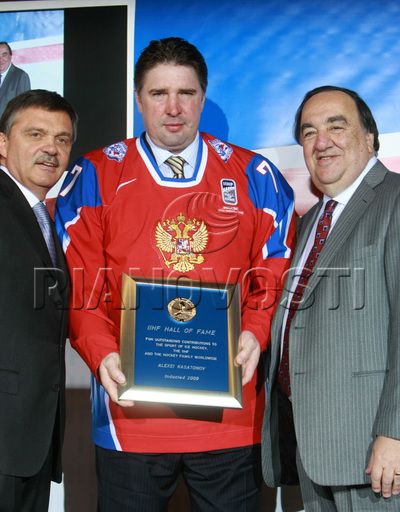
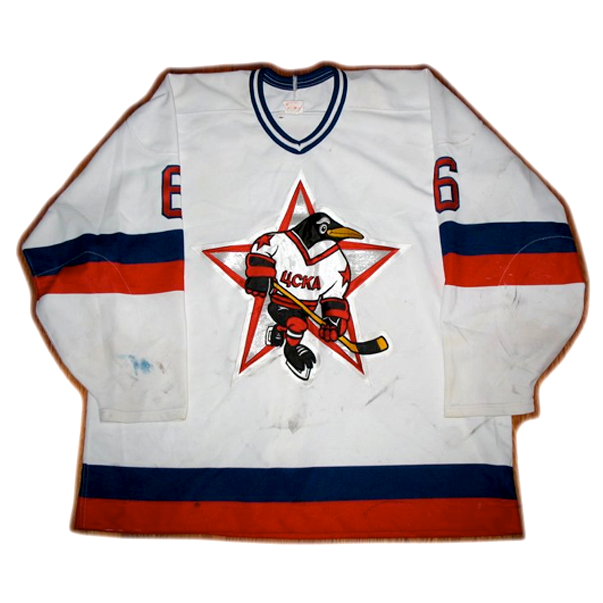
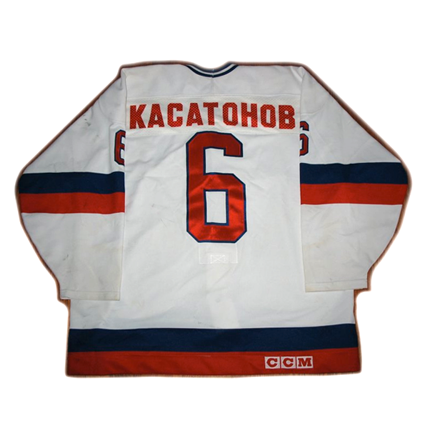
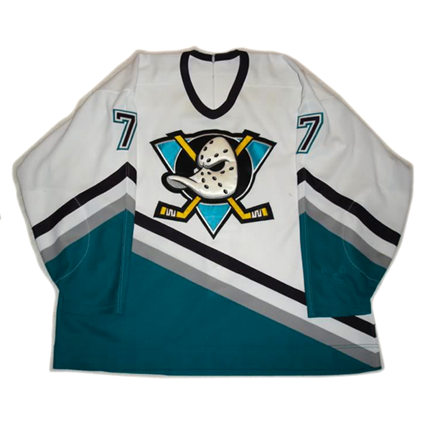
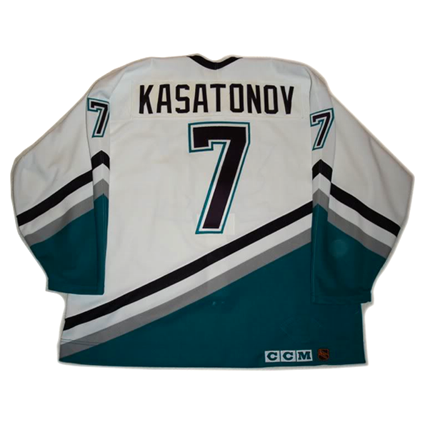










I thought the ESPN documentary dropped the ball a little. They mentioned how Kasatonov didn't support Fetisov's bid to get released from his military contract, but didn't make the connection that those two guys became teammates again in New Jersey. I guess that didn't go over so well. Fetisov could have had his own documentary, there's more to the story.
ReplyDelete